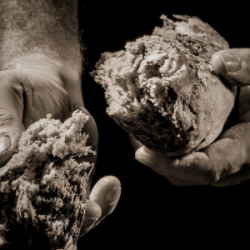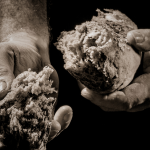
And what was the result? Two chapters later we read:
All the believers were one in heart and mind. No one claimed that any of their possessions was their own, but they shared everything they had. With great power the apostles continued to testify to the resurrection of the Lord Jesus. And God’s grace was so powerfully at work in them all that there were no needy persons among them. (Acts 4:32-34)
Welcome Readers! Please subscribe to Social Jesus Here.
This is Part 3 of Pentecost and Social Justice
(Read this series from the beginning at Part 1 and Part 2.)
There was not one needy person among them. Within their community, they had eradicated poverty. How? The passage explains:
For from time to time those who owned land or houses sold them, brought the money from the sales and put it at the apostles’ feet, and it was distributed to anyone who had need. (Acts 4:34-35)
What does this mean for those who desire a fresh outpouring of spirit on Jesus’ followers today?
The Church living in the wake of Pentecost should be concerned first and foremost with injustice, violence, and oppression in our world today. We should be sharing a gospel that is good news to the poor. We should be passionate about liberating the oppressed and participating in actions alongside others who are endeavoring to make our world a safe, compassionate home for everyone, including those who are different from us. Those who claim to follow the Jesus of our story cannot be indifferent to the tremendous social injustices taking place around us right now. We must reject a narrow, limited version of Christianity that is only concerned with private piety, personal spirituality, or giving people assurance of post mortem heaven. Christianity that resembles the Jesus in our story refuses to leave our material lives, including injustices we and others face, untouched or unchallenged by God’s love and Jesus’ redemption. A gospel that only focuses on believing in Jesus so that a person can be forgiven and go to heaven after they die is insufficient. Having the same Spirit on us that was also on the Hebrew Prophets and Jesus means being dedicated, like them, to matters of justice and the social dimensions of Jesus’ gospel. Jesus taught about a God who had a heart for social justice. And that God called his followers to make sure others around them had what they needed to thrive.
Pentecost reminds us that Christians should be deeply concerned with social justice because it reflects the heart of God’s love for humanity. Throughout the Bible, there is a clear emphasis on caring for the poor, the oppressed, and the marginalized. In Micah 6:8, believers are called to “act justly, love mercy, and walk humbly with your God.” This verse and others, such as Proverbs 31:8–9 and Isaiah 1:17, stress the importance of speaking up for those who cannot speak for themselves and defending the rights of the vulnerable.
Jesus himself modeled social justice during his ministry: healing the sick, feeding the hungry, and standing with the outcasts of society. To follow Christ means to uphold his values, including actively working toward fairness, equity, and compassion in our communities. Social justice is not a political trend. It is a spiritual calling rooted in love, and a church imbued with the Spirit will heed this call.
Are you receiving all of RHM’s free resources each week?
Begin each day being inspired toward love, compassion, justice and action. Free.
Sign up at HERE.















